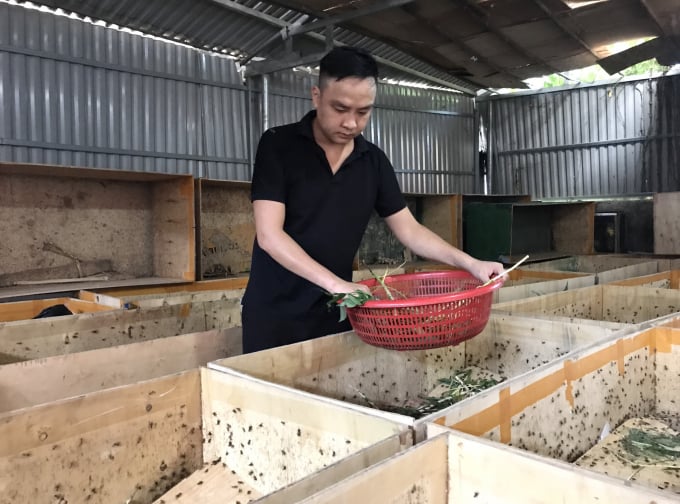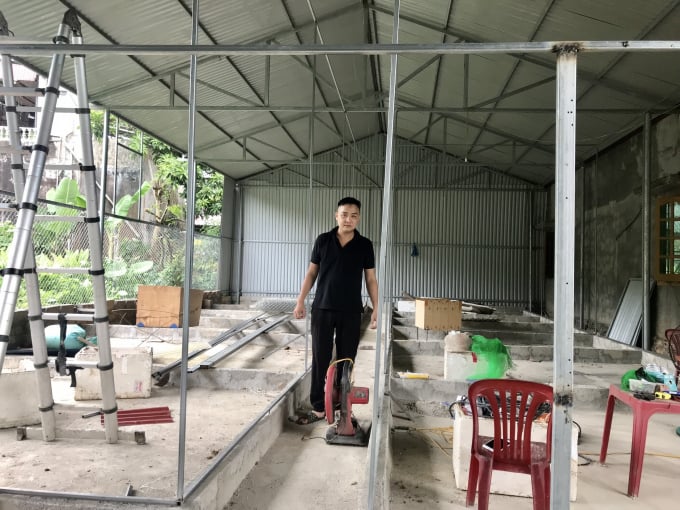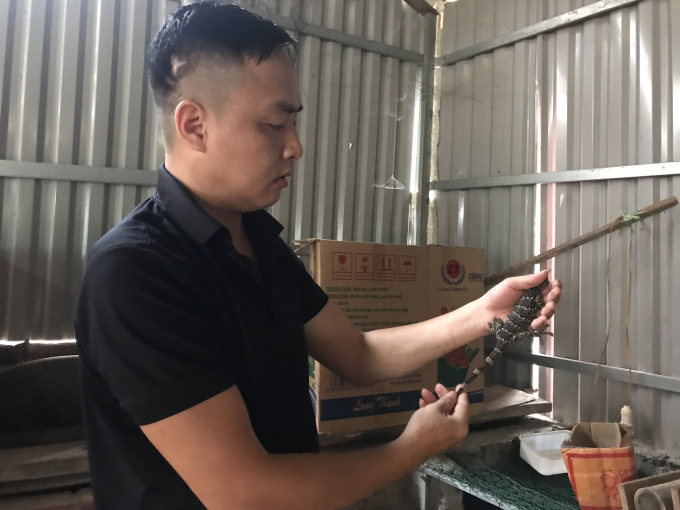May 21, 2025 | 05:56 GMT +7
May 21, 2025 | 05:56 GMT +7
Hotline: 0913.378.918
May 21, 2025 | 05:56 GMT +7
Hotline: 0913.378.918

Trieu Quang Tu is feeding crickets. Photo: Tam Tinh.
In 2015, after two years studying at Viet Bac Art and Culture College in Thai Nguyen City, Trieu Quang Tu graduated. With a hobby of farming, he actively watched a lot of TV programs about crickets farming and read many articles on agricultural extension.
Realizing that cricket farming model could be applied at a farm near his house Tu decided to raising crickets on trial. He contacted and ordered five bags of cricket eggs to hatch in a foam box. After seven days, he had two boxes of baby crickets.
At that time, the cricket farming model had not developed yet in Bac Kan. Tu faced many difficulties in finding documents to raise crickets. At first, he faced failures. When mastering the care and reproduction techniques, Tu turned his family's garden in Bang Lung town, Cho Don District into a 1,000 square meter cricket farm with 100 wooden boxes.
Although he gained initial success he faced challenges in finding market for his products. Tu went to selling points of OCOP product, pubs and customer near and far by himself. In 2019, Tu's facility had a canned cricket product qualified OCOP's three-star standard and being displayed at the stalls in the province.

A corner of the cricket farm of 29-year-old owner Trieu Quang Tu. Photo: Tam Tinh.
Gradually, more and more customers came his farm to buy the product. Few months later, canned cricket product became more and more popular to people in Cho Don District. Not only selling the product at pubs in the province, Tu brought his products to the provinces of Cao Bang, Thai Nguyen and Ha Noi.
Many customers also ordered commercial crickets to feed their birds. Cricket eggs were sold for VND100,000-VND200,000 per tray.
"Crickets are insects living in groups, their food is easy to find. I can grow cassavas or sugarcanes in the garden. Because their life circle is short I can get investment capital quickly. After one month, I harvested 50-60 kilograms of finished crickets earning more than VND10 million. In order to make crickets grow faster, gaining higher yield and quality, avoiding diseases, farmers should pay attention to build higher, cool and clean barns, avoiding windy and rainy sites," 29-year-old owner Trieu Quang Tu said.
Tu added before processing, farmer should leave crickets to go hunger for three days to detoxify toxics from their bodies. After that, crickets are fed with green bean powder then left to go hungry for the next three days. Before storing in the refrigerator, the crickets are cleaned with dilute salt water.

Tu continues to open a gecko farming model, giving guidance to other households in Dong Lac commune, Cho Don distruct, Bac Kan. Photo: Tam Tinh.
In addition to cricket farming, in 2019 Tu continued to open a gecko farming model. So far, he has expanded the model and instructed other households in Dong Lac commnue, Cho Don District to raise this type of reptile. Tu is completing an ornamental bird farming model taking advantage of available crickets, a feed source for birds.
Trieu Quang Tu's cricket farming model is considered as new farming model in locality with stable market and suitable to small-scale farmers because with this model they can take advantage of their leisure time to increase incomes.

(VAN) Khanh Hoa is investing over 545 billion VND to develop 240 hectares of high-tech marine aquaculture in order to guarantee a consistent supply of seafood exports and achieve the USD 1 billion target.

(VAN) Minister of Agriculture and Environment Do Duc Duy held a meeting with Soopakij Chearavanont, Chairman of C.P. Group, on May 15.
/2025/05/16/3800-0-nongnghiep-143756.jpg)
(VAN) Suntory PepsiCo Vietnam coordinated with the Ministry of Education and Training to implement an education program on water conservation, reaching nearly 1 million primary school students nationwide.

(VAN) Vietnam’s TH Group officially put its high-tech fresh milk processing plant into operation in the Russian Federation, marking a historic moment as the first TH true MILK cartons were produced in Russia.

(VAN) Use of high-quality broodstock and biotechnology is regarded as the most effective approach to ensuring sustainable and economically viable shrimp aquaculture ahead of climate change and the emergence of increasingly intricate disease patterns.

(VAN) Carbon farming is a form of agricultural practices that helps absorb more greenhouse gases than it emits, through smart management of soil, crops, and livestock.

(VAN) This is a key content of the Memorandum of Understanding recently signed between the Vietnam Fisheries Society and Kunihiro Inc of Japan.